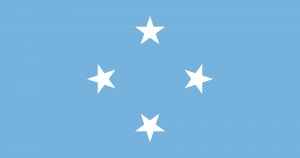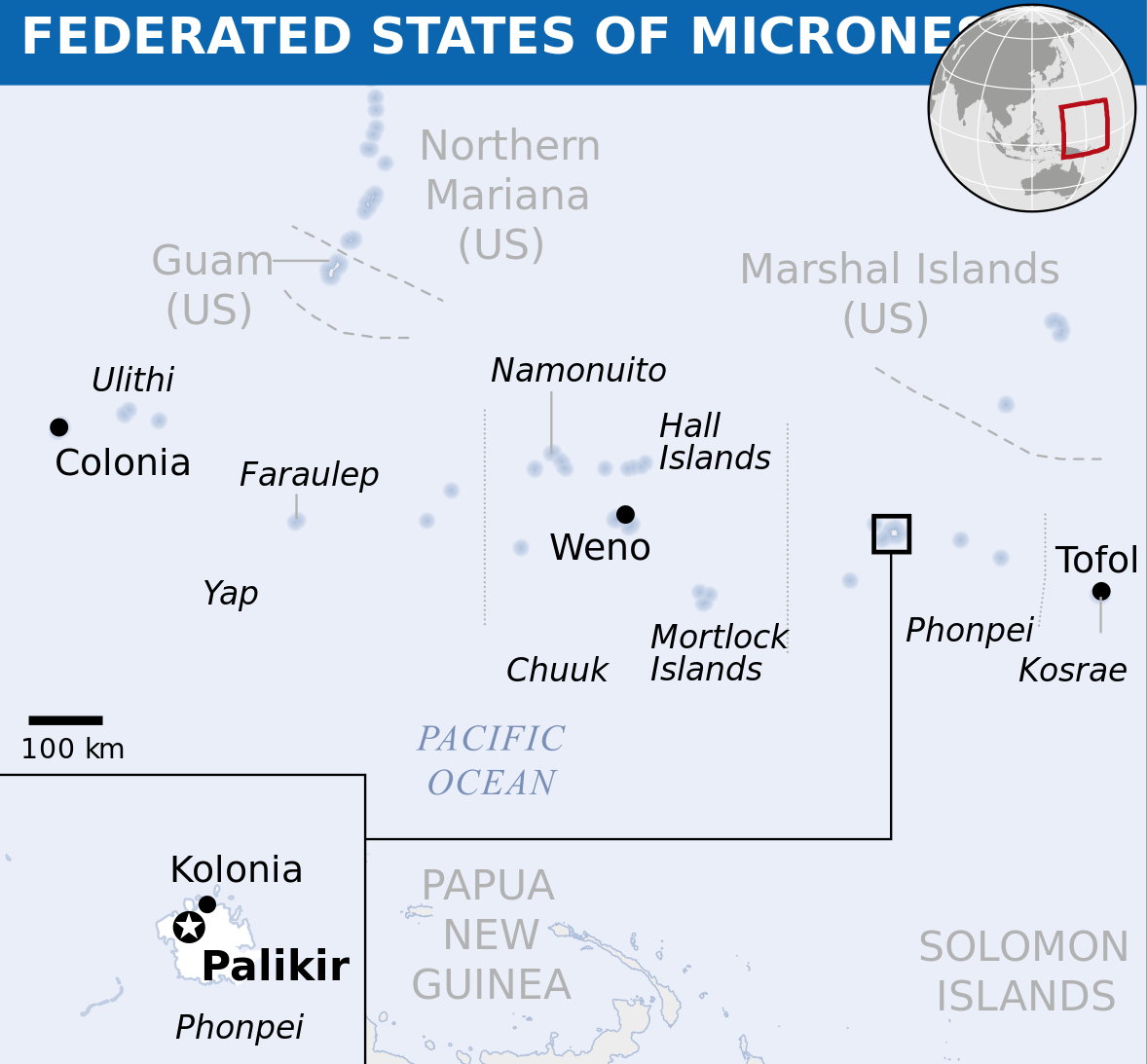
Federated States of Micronesia
International Disaster Response Law in the Pacific
Overview

Legal Preparedness for International Assistance Assessment
1. Does FSM have a clear legal framework for disaster risk management which includes procedures relating to international disaster assistance?
The key legislation for disaster relief in FSM is the Disaster Relief Assistance Act (DRA Act) 1989. This is supplemented by the National Disaster Relief Plan 2016. However, this framework provides minimal guidance on procedures related to international assistance.
FSM has a formal relationship with the United States government and the Federal Emergency Management Agency (FEMA) for the provision of aid as part of the Compact Agreement.
2. Do FSM’s laws and regulations clearly set out a focal point for coordinating international disaster assistance?
The DRA Act formally provides that the President may request aid from the US Government and other overseas public and private entities. In addition, it provides that the President shall coordinate such foreign aid with assistance provided by the National Government. In practice the National Disaster Response Plan (NDRP) provides that the National Disaster Committee (NDC) is responsible for “accessing international, regional and bi-lateral support arrangements for disaster response”. However, beyond these vague statements as to responsibility for requesting aid, the legislation and policy documents are largely silent on this subject.
3. Do FSM’s laws and regulations outline the roles and responsibilities of different institutions relating to international disaster assistance?
The NDRP states that the President has various roles in disaster management, including:
• Receiving advice from the National Disaster Council.
• Decision-making in relation to priorities, committing resources and accessing international assistance during disasters.
The DRA Act provides that in the event of a threatened or existing disaster, the President may provide immediate assistance from the Disaster Relief Fund, to save lives, preserve property and protect public health and safety.
The National Disaster Committee (NDC) is responsible to the President for policy development and for the strategic management of planning and arrangements for disaster preparedness and response. It is also responsible for the overview of disaster events and for accessing international, regional and bi-lateral support arrangements for disaster response.
The Disaster Response Plan outlines the functions of the NDC. These include:
• Advising the President on strategic institutional, policy and funding issues necessary to provide for effective disaster preparedness and response in FSM.
• Manage relationships with international, regional and bi-lateral partners to coordinate and optimise external support for disaster management activities.
• Oversee the establishment of national disaster management operational arrangements.
• In the event of a disaster, provide management oversight of, and advice to the President on the response to the event.
4. Do FSM’s laws and regulations outline a process for requesting/welcoming offers of international disaster assistance, and for terminating international assistance?
Beyond the ambiguous statements outlined above there are no formal processes for requesting or terminating international disaster assistance.
5. Do FSM’s laws and regulations provide for necessary legal facilities to be provided to international assisting actors?
There are no specific laws or regulations pertaining to international assisting actors generally, but FSM’s relationship with the United States provides for a number of specific facilities for the US armed forces and officials, both specifically related to disasters and as a general consequence of the agreement. In addition, the US retains the ability to restrict access by foreign military to the FSM.
6. Do FSM’s laws and regulations set out quality standards for international assisting actors?
The National Disaster Response plan provides for the development of SOPs for any “committee, team, working group or centre having a role under the Plan”. These SOPs must include “the membership, terms of reference and mode of activation and operation of the committee, team, working group or centre and are to be approved by the NDC or the relevant SDC”. These requirements apply to both international and domestic assisting actors.
In addition, international assistance agencies are expected to establish their support mechanisms within the framework of the Plan and “support the coordination processes of the National Disaster Coordination Team”.
7. Do FSM’s laws and regulations set out eligibility requirements for international assisting actors to receive legal facilities?
There are no obvious regulations to establish eligibility requirements for international assisting actors or provide special facilities for such actors.
8. Do FSM’s laws and regulations establish a specialised unit for expediting the entry of international disaster assistance?
There is no formal provision for a specialised unit to expedite international disaster assistance in the FSM at either the state or federal levels.
9. Do FSM’s laws and regulations provide adequate transparency, safeguards and accountability mechanisms governing international disaster relief and initial recovery assistance?
Specific constitutional provisions apply to all foreign assistance. All monetary assistance received by the FSM government must be placed in a foreign assistance fund. In addition, states must receive assistance equally except in specific circumstance. These are defined as “… where a particular distribution is required by the terms or special nature of the assistance”. Otherwise, “each state shall receive a share equal to the share of the national government and to the share of every other state”.
Beyond these general constitutional provisions, the DRP lays down specific requirements for Standard Operating Procedures around accountability. These state that the required SOPs for “any committee, team, working group or center” involved in DRM assistance (both domestic and international) must include provisions to “minimise the potential for losses and misappropriation of resources and funds during disaster operations” as well as including “accountability mechanisms”.
Specific provisions apply to aid provided through the International Organisation for Migration. IOM maintains three prepositioned warehouses of supplies for post disaster response, including hygiene, shelter and water related materials. These supplies are only released in coordination with USAID following a US Presidential decree.
10. Do FSM’s laws and regulations outline procedures for international disaster assistance sent from, and transiting through the Federated States of Micronesia?
There are no obvious provisions relating to assistance emanating from, or transiting through, the FSM.
Laws, policies, plans and other resources
-
Chuuk Joint State Action Plan for Disaster Risk Management and Climate Change, 2017
-
Disaster Response Plan 2016
-
Nation Wide Integrated Disaster Risk Management and Climate Change Policy, 2013
-
Pohnpei Joint State Action Plan for Disaster Risk Management and Climate Change 2017
-
Yap Joint State Action Plan for Disaster Risk Management and Climate Change 2016
-
Yap Joint State Action Plan for Disaster Risk Management and Climate Change, 2017
![]()

